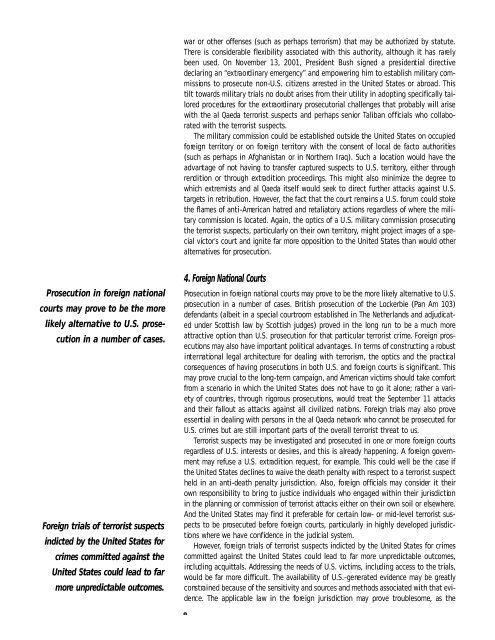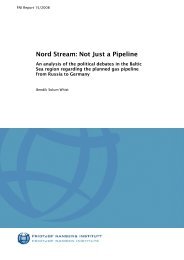David Scheffer Options for Pro secuting International Te r ro rists B ...
David Scheffer Options for Pro secuting International Te r ro rists B ...
David Scheffer Options for Pro secuting International Te r ro rists B ...
Create successful ePaper yourself
Turn your PDF publications into a flip-book with our unique Google optimized e-Paper software.
P <strong>ro</strong>secution in fo reign national<br />
courts may p<strong>ro</strong>ve to be the more<br />
likely alternative to U.S. p<strong>ro</strong> s e-<br />
cution in a number of cases.<br />
Fo reign trials of ter<strong>ro</strong>rist suspects<br />
indicted by the United States fo r<br />
crimes committed against the<br />
United States could lead to fa r<br />
m o re unpre d i c table outc o m e s.<br />
war or other of f e nses (such as perhaps ter<strong>ro</strong>rism) that may be authorized by statute.<br />
T he re is cons ide rable flexibility associated with this autho r i t y, although it has ra re l y<br />
been used. On November 13, 2001, Pre s ide nt Bush sig ned a pre s ide nt ial dire c t i v e<br />
de c l a r i ng an “ex t ra o rd i nary eme rge ncy” and empowering him to establish military comm<br />
i s s io ns to p<strong>ro</strong>secute non-U.S. citizens arrested in the United States or ab<strong>ro</strong> a d. This<br />
tilt towards military trials no doubt arises f<strong>ro</strong>m their utility in ado p t i ng specifically tail<br />
o red p<strong>ro</strong> c e du res <st<strong>ro</strong>ng>for</st<strong>ro</strong>ng> the ex t ra o rd i nary p<strong>ro</strong> s e c u t o r ial challenges that p<strong>ro</strong>bably will arise<br />
with the al Qaeda ter<strong>ro</strong>rist suspects and perhaps senior Taliban of f ic ials who collaborated<br />
with the ter<strong>ro</strong>rist suspects.<br />
T he military commission could be established outside the United States on occupie d<br />
fo re ign territory or on fo re ign territory with the cons e nt of local de facto autho r i t ie s<br />
( s uch as perhaps in Afghanistan or in No r t hern Iraq). Such a location would have the<br />
a d v a nt a ge of not having to tra nsfer captured suspects to U.S. territory, either th<strong>ro</strong> u g h<br />
re nd i t ion or th<strong>ro</strong>ugh ex t ra d i t ion p<strong>ro</strong> c e e d i ng s. This mig ht also minimize the de g ree to<br />
w h ich ex t remists and al Qaeda itself would seek to direct further attacks against U.S.<br />
t a rgets in re t r i b u t ion. Ho w e v e r, the fact that the court re ma i ns a U.S. <st<strong>ro</strong>ng>for</st<strong>ro</strong>ng>um could stoke<br />
t he flames of ant i - A me r ican hatred and re t a l iatory actio ns re g a rdless of whe re the military<br />
commission is located. Again, the optics of a U.S. military commission p<strong>ro</strong> s e c u t i ng<br />
t he ter<strong>ro</strong>rist suspects, particularly on their own territory, mig ht p<strong>ro</strong>ject ima ges of a spec<br />
ial victor’s court and ignite far mo re opposition to the United States than would othe r<br />
a l t e r natives <st<strong>ro</strong>ng>for</st<strong>ro</strong>ng> p<strong>ro</strong> s e c u t io n .<br />
4. Fo reign National Courts<br />
P <strong>ro</strong> s e c u t ion in fo re ign na t io nal courts may p<strong>ro</strong>ve to be the mo re likely alternative to U.S.<br />
p <strong>ro</strong> s e c u t ion in a number of cases. British p<strong>ro</strong> s e c u t ion of the Locke r b ie (Pan Am 103)<br />
de f e nda nts (albeit in a special court<strong>ro</strong>om established in The Ne t he r l a nds and adjud ic a ted<br />
under Scottish law by Scottish judges) p<strong>ro</strong>ved in the long run to be a much mo re<br />
a t t ractive option than U.S. p<strong>ro</strong> s e c u t ion <st<strong>ro</strong>ng>for</st<strong>ro</strong>ng> that particular ter<strong>ro</strong>rist crime. Fore ign p<strong>ro</strong> se<br />
c u t io ns may also have important political advant a ge s. In terms of cons t r uc t i ng a <strong>ro</strong> b u s t<br />
i nt e r na t io nal legal arc h i t e c t u re <st<strong>ro</strong>ng>for</st<strong>ro</strong>ng> de a l i ng with ter<strong>ro</strong>rism, the optics and the pra c t ic a l<br />
c o ns e q u e nces of having p<strong>ro</strong> s e c u t io ns in both U.S. and fo re ign courts is sig n i f ic a nt. This<br />
may p<strong>ro</strong>ve cruc ial to the long-term campaign, and Ame r ican vic t i ms should take comfo r t<br />
f <strong>ro</strong>m a scena r io in which the United States does not have to go it alone; ra t her a variety<br />
of count r ie s, th<strong>ro</strong>ugh rigo <strong>ro</strong>us p<strong>ro</strong> s e c u t io ns, would treat the September 11 attacks<br />
a nd their fallout as attacks against all civilized na t io ns. Fore ign trials may also p<strong>ro</strong> v e<br />
e s s e nt ial in de a l i ng with persons in the al Qaeda network who cannot be p<strong>ro</strong>secuted fo r<br />
U.S. crimes but are still important parts of the overall ter<strong>ro</strong>rist threat to us.<br />
<st<strong>ro</strong>ng>Te</st<strong>ro</strong>ng> r <strong>ro</strong>rist suspects may be investigated and p<strong>ro</strong>secuted in one or mo re fo re ign courts<br />
re g a rdless of U.S. int e rests or de s i re s, and this is alre a dy happening. A fo re ign go v e r nme<br />
nt may refuse a U.S. ex t ra d i t ion request, <st<strong>ro</strong>ng>for</st<strong>ro</strong>ng> exa m p l e. This could well be the case if<br />
t he United States de c l i nes to waive the death penalty with respect to a ter<strong>ro</strong>rist suspect<br />
held in an ant i - death penalty jurisdic t ion. Also, fo re ign of f ic ials may cons ider it the i r<br />
own re s p o nsibility to bring to justice ind i v iduals who eng a ged within their jurisdic t io n<br />
in the planning or commission of ter<strong>ro</strong>rist attacks either on their own soil or elsewhe re.<br />
A nd the United States may find it pre f e rable <st<strong>ro</strong>ng>for</st<strong>ro</strong>ng> certain low- or mid-level ter<strong>ro</strong>rist suspects<br />
to be p<strong>ro</strong>secuted befo re fo re ign courts, particularly in highly developed jurisdict<br />
io ns whe re we have confide nce in the jud ic ial system.<br />
Ho w e v e r, fo re ign trials of ter<strong>ro</strong>rist suspects ind icted by the United States <st<strong>ro</strong>ng>for</st<strong>ro</strong>ng> crime s<br />
committed against the United States could lead to far mo re unpre d ictable outcome s,<br />
i nc l ud i ng acquittals. Addre s s i ng the needs of U.S. vic t i ms, inc l ud i ng access to the tria l s,<br />
would be far mo re difficult. The availability of U.S.-ge ne rated evide nce may be gre a t l y<br />
c o ns t ra i ned because of the sensitivity and sources and me t hods associated with that evide<br />
nc e. The applicable law in the fo re ign jurisdic t ion may p<strong>ro</strong>ve t<strong>ro</strong> u b l e s o me, as the<br />
8













